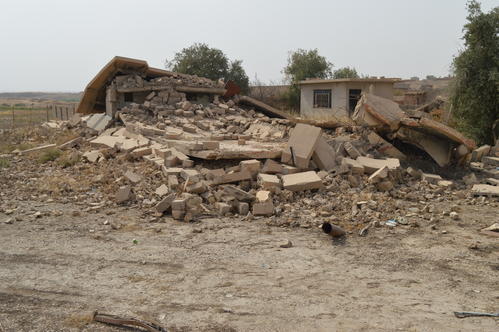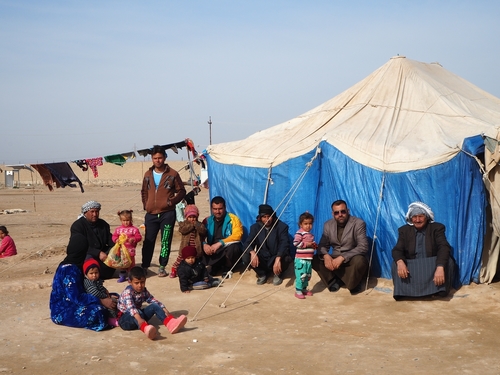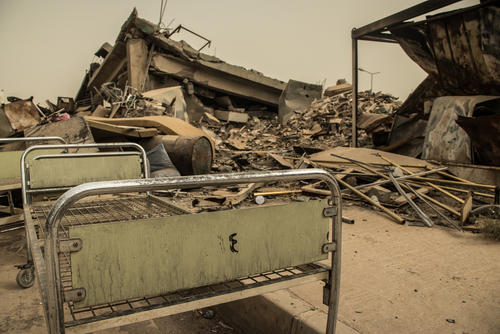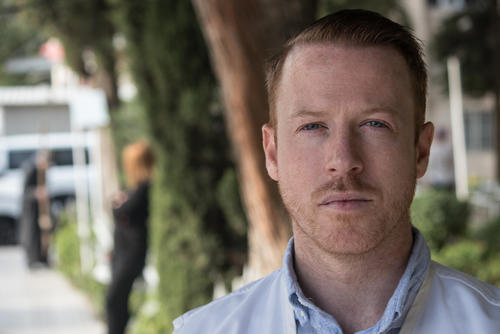Since 2014, the conflict in Iraq has forced an estimated 5.7 million children and adults to leave their homes and seek shelter from the fighting. More than 2.8 million displaced Iraqis have returned home, while more than 2.9 million people remain displaced (IOM).
MSF has seen an increasing number of families leaving the camps and returning home. Those remaining in the camps are often the poorest and the most vulnerable who cannot afford to leave the camps and rebuild their destroyed homes. Others say they can’t go home because they don’t feel safe.
Winter is exacerbating the inadequate living conditions in the camps. As temperatures dip below five degrees Celsius, we are seeing growing numbers of patients with respiratory infections. The poor living conditions are also causing skin diseases, diarrhoea and neonatal sepsis (a bacterial infection in newborn babies).
In West Mosul, Anbar, Hawija and Salaheddin, homes, infrastructure and services have been almost completely destroyed. In West Mosul and Hawija, the healthcare system remains in a dire situation. Most hospitals and clinics were bombed and there is a severe lack of services, equipment, medical staff and medication. The city of Hawija is still virtually empty as people wait for the area to be cleared of improvised explosive devices, mines and unexploded ordnance. In many post-conflict areas unemployment is also high and people struggle to cover basic living costs.
Operational update
MSF works across Iraq in the governorates of Erbil, Diyala, Ninewa, Kirkuk, Salaheddin, Anbar and Baghdad. Below is an update on the latest operations.
New projects
Since the Hawija district was retaken from IS, MSF has conducted several exploratory visits to assess the healthcare needs. We have started a project in Abbasi sub-district, where we provide non-communicable diseases (NCD) healthcare to the returning population in collaboration with the Directorate of Health. We’ve also set up five clean water distribution points in the centre of Abbasi town and are conducting health and hygiene promotion activities.
MSF has opened a new field office in Ramadi city, the capital of Anbar province. We are opening a new mental health unit in Ramadi Teaching Hospital to provide specialised mental healthcare to patients with moderate and severe mental health disorders, including psychiatric care.
Updates on existing projects
MSF’s field hospital in Qayyarah is working at full capacity as more people return to their homes in the area and need access to healthcare. We are seeing an increase in patients with burns, due to the use of heaters, and a large spike in patients with injuries caused by improvised explosive devices (IED), mines and unexploded ordnance. In December, we admitted 13 patients with injuries caused by IEDs, mines and unexploded ordnance, compared with only seven cases in October and zero in November. Eight out of the 13 cases in December were children.
MSF’s Baghdad Medical Rehabilitation Centre (BMRC) was officially opened on 6 December and attended by the Deputy Minister of Health. The BMRC provides comprehensive care for post-operative patients including physiotherapy, nursing care, pain management and psychological support to civilian war victims. We treated 50 patients in the outpatient and inpatient departments between August and November 2017.
Since West Mosul was retaken from IS, people have started to return to the city. However, much of the west side of the city is destroyed and there is a dire lack of healthcare services. MSF’s hospital in West Mosul is only one of two functioning hospitals in the west and is operating around the clock to keep up with demand. In December, we assisted 261 deliveries and admitted 2,370 patients in our emergency room. We have expanded our sexual reproductive programme to offer antenatal, postnatal and family planning services.
In Zummar, the frontline has been stabilised allowing more than 2,600 families to return to the area. As a result, we’ve seen an increase in the number of patients at our maternity unit. In November, we provided 1,642 sexual reproductive health consultations, assisted 287 deliveries and made 70 emergency referrals to Mosul for specialised medical assistance. The number of emergency room patients has increased to 822 and we hospitalised 54 children in Tal Marak hospital. Non-communicable diseases (NCD) consultations almost doubled, reaching 454, including 93 new patients.
In Jalawla and Sadiya (Diyala governorate), MSF provides NCD, mental health and sexual reproductive healthcare for families returning to the area, in collaboration with the Directorate of Health. There are 1,977 patients currently enrolled in MSF’s NCD programme in Sadiya and Jalawla, and 1,092 NCD patients received treatment in November 2017. In addition, MSF provided 648 sexual reproductive healthcare consultations and 308 individual and 60 group educational sessions on topics of NCD, mental health and sexual reproductive health in November.

MSF continues to work in several camps for internally displaced people across Iraq
Anbar
MSF is working in the Amriyat Al-Fallujah (AAF) and Habbaniya Tourist City (HTC) camps. The number of consultations increased despite the reduction of internally displaced people in the camps. During November, there were 8,725 outpatient department consultations, 910 NCD consultations and 464 mental health consultations.
Diyala
MSF’s Diyala project provides healthcare services for the internally displaced in Alwand Camps 1 and 2. We currently have 741 patients enrolled in the NCD programme in the two camps. In November, across both camps, the team conducted 100 individual and 129 group health educational sessions about NCD, sexual reproductive health, psychological first aid and endemic diseases.
Qayyarah
MSF is running a nutrition and integrated mental health project in Jeda´ah camps 5 and 6 and Airstrip camp, which host more than 130,000 internally displaced people. MSF is running three ambulatory therapeutic feeding centres in Jeda´ah 6 and 7 and Airstrip camp. In the last six months, these MSF feeding centres have admitted 2,478 children under the age of five for treatment of acute malnutrition.
Erbil/Mosul
MSF is running mental health activities and non-communicable diseases activities for displaced people in Hassan Sham camps (M1, U2, and U3) and Dabaga camps 1 and 2, and for host communities in Kalak. We provided 940 mental health consultations (176 new cases) and 274 NCD consultations in December.
Kirkuk
In Daquq camp, where MSF teams started working in January 2017, we continue to provide outpatient department, NCD, mental health care (including psychiatric referrals) and health promotion activities for the displaced population.
Tikrit
MSF has been running mobile clinics in the city of Tikrit and the surrounding areas since June 2016. The clinics offer outpatient and mental health consultations. In January 2017, MSF established a primary healthcare centre in Al Allam camp. As people return to their homes, the number of patients who attend our mobile clinics and healthcare centre has decreased. MSF is now conducting new assessments in areas where people are returning to determine the healthcare needs and where MSF can provide support.
Project closures
MSF has closed its primary healthcare clinic (PHCC) in Kilo 18 camp in Anbar due to a reduction in numbers of internally displaced people and the opening of a third PHCC run by a local organisation. In 2017, MSF provided 10,760 primary healthcare consultations in the Kilo 18 clinic.
At the end of December 2017, MSF completed its support of the Al-Fallujah Teaching Maternity Hospital in Anbar. The emergency room was rehabilitated, the sterilisation of the operating theatre was upgraded, the capacity of the waste management was improved and we provided training for the hospital’s nursing staff.






